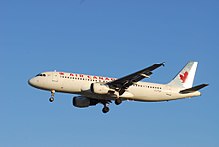Air Canada Flight 624
 C-FTJP, the aircraft involved in the accident, pictured in April 2008 | |
| Accident | |
|---|---|
| Summary | CFIT (Controlled flight into terrain) Date March 29 2015 |
| Site | Halifax International Airport, Halifax, Canada 44°52'2.08"N 63°31'33.79"W |
| Aircraft type | Airbus A320-211 |
| Operator | Air Canada |
| Registration | C-FTJP |
| Flight origin | Toronto Pearson International Airport, Toronto, Canada |
| Destination | Halifax Stanfield International Airport, Halifax, Canada |
| Passengers | 133 |
| Crew | 5 |
| Fatalities | 0 |
| Injuries | 23 |
| Survivors | 138 (All) |
Air Canada Flight 624 (AC624/ACA624)[1][2][3] was a scheduled domestic passenger flight from Toronto to Halifax. During heavy snow and poor visibility at 00:43 ADT (03:43 UTC) on March 29, 2015, the Airbus A320-211 landed short of the runway and was severely damaged. The accident left the airport without electric power; it was consequently closed for a period of time. Twenty-three people were injured.
On April 2, 2015, Air Canada sent payments of CDN$5000 to all passengers involved.[4] A class action lawsuit has been filed in relation to this incident.[5]
Accident
Air Canada Flight 624 departed from Toronto Pearson International Airport (YYZ) bound for Halifax Stanfield International Airport (YHZ). It was carrying 133 passengers and five crew. The Airbus A320 operating the flight, registration C-FTJP, impacted the ground 225 metres (738 ft) short of the threshold of runway 05 (which is not equipped for precision landing),[6] smashing through an ILS-LOC antenna array causing the landing gear to separate from the aircraft, and hitting a power line that cut power to the airport, leaving the airport without electric power for about 90 minutes.[7] The aircraft then climbed an embankment up to the runway level, skidded on its belly and stopped 570 metres (1,870 ft) past the threshold.[6]
The aircraft was extensively damaged, with the loss of all landing gear and port engine. The wings and tailplane were also damaged. Twenty-three passengers were taken to hospital with non-life-threatening injuries.[6] Both pilots were amongst those taken to hospital. All but one of those taken to hospital were released the same day.[8] The weather at the time of the accident was described as "stormy" (winter conditions). The loss of power to the airport may have been due to the aircraft clipping transmission lines before hitting the runway.[9] Electricity was restored to the airport by 02:12 ADT.[7]
While the aircraft collided with objects outside the airport perimeter and was damaged beyond repair, Air Canada initially called the accident a ″hard landing″, sparking outrage among some of the passengers.[10]
Aircraft
The aircraft was an Airbus A320-211, equipped with two CFM56-5A1 engines. Its serial number was 233 with a fleet number of 214, and it first flew on July 10, 1991. It was owned by GECAS and leased to Air Canada. As a result of the accident, the aircraft was written off.[11]
Investigation
The Transportation Safety Board has opened an investigation into the accident.[12]
The TSB stated that there were no mechanical or maintenance faults uncovered with the aircraft. The TSB is examining the role of the pilots in the cause of the crash. [13]
Three Bureau d'Enquêtes et d'Analyses pour la Sécurité de l'Aviation Civile (BEA) investigators from France and two technical advisers from Airbus travelled to Canada to participate in the investigation.[14]
On 30 March 2017, Air Canada filed a lawsuit against Airbus, alleging that the manufacturer "failed to identify shortcomings of the Airbus A320", which included uncommanded decent below the pre-programmed glide slope.[15]
See also
References
- ^ "Air Canada AC624 touched down 335 metres short of runway, TSB says". CBC News. March 29, 2015.
- ^ "Air Canada Flight AC624: Toronto to Halifax – AC624 Air Canada Flight". Airportia.com. Retrieved March 29, 2015.
- ^ "Full flight information and flight history for Air Canada aircraft C-FTJP". Flightradar24 AB. Retrieved March 29, 2015.
- ^ Air Canada Flight 624 passengers receiving $5K cheques from airline; Lawyer Ray Wagner calls it 'a gratuity' and says $5K payments don't change airline's liability, CBC News, April 2, 2015.
- ^ AC 624 crash: MacGillivray Law to file class action lawsuit; A second lawyer, Ray Wagner, says his firm is considering a class action lawsuit as well, CBC News, March 30, 2015.
- ^ a b c Simon, Hradecky (March 29, 2015). "Accident: Air Canada A320 at Halifax on Mar 29th 2015, touched down short of runway". The Aviation Herald. Retrieved March 29, 2015.
- ^ a b "Air Canada AC624 slides off runway in Halifax, 23 sent to hospital". CBC. March 29, 2015. Retrieved March 29, 2015.
- ^ "Air Canada Flight 624 crashes into power line upon landing in Halifax". Global News. Shaw Media. March 29, 2015. Retrieved March 29, 2015.
- ^ "Airbus A320 Air Canada plane crashes on runway at Halifax airport". The Independent. March 29, 2015. Retrieved March 29, 2015.
- ^ "Air Canada Flight 624 crash: ′Hard landing′ too soft a term?". CBC. March 31, 2015. Retrieved March 31, 2015.
- ^ "C-FTJP Air Canada Airbus A320-211 – cn 233". Planespotters.net.
- ^ Doucette, Keith. "23 treated in hospital after Air Canada plane slides off Halifax runway". Citynews. Retrieved March 29, 2015.
- ^ "Aviation Investigation A15H0002: Ground contact prior to runway threshold of Air Canada Flight 624 during approach to Halifax Stanfield International Airport". Transportation Safety Board of Canada. Retrieved August 15, 2016.
- ^ "Flight AC 624, Airbus A320, registered C-FTJP – Halifax Stanfield International Airport (Canada), 29 March 2015" (Archive). Bureau d'Enquêtes et d'Analyses pour la Sécurité de l'Aviation Civile. Retrieved on April 2, 2015.
- ^ Thomson, Aly. "Air Canada lawsuit accuses Airbus of negligence in Halifax crash landing". Atlantic. Retrieved March 31, 2017.
